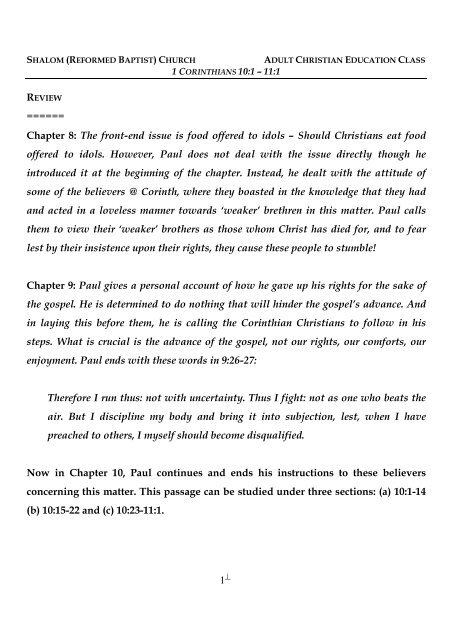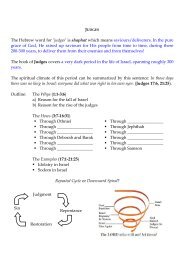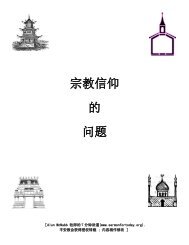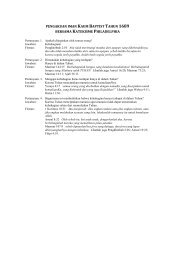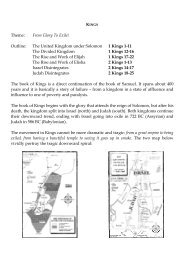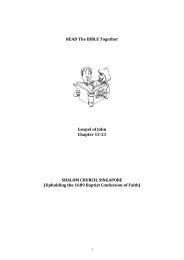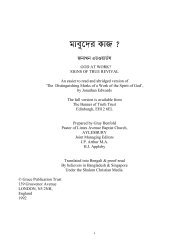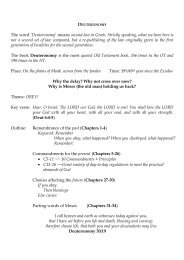1 Corinthians 10:1 - 11:1 (Notes) - Shalom Church Singapore
1 Corinthians 10:1 - 11:1 (Notes) - Shalom Church Singapore
1 Corinthians 10:1 - 11:1 (Notes) - Shalom Church Singapore
Create successful ePaper yourself
Turn your PDF publications into a flip-book with our unique Google optimized e-Paper software.
SHALOM (REFORMED BAPTIST) CHURCH<br />
1 CORINTHIANS <strong>10</strong>:1 – <strong>11</strong>:1<br />
ADULT CHRISTIAN EDUCATION CLASS<br />
REVIEW<br />
======<br />
Chapter 8: The front-end issue is food offered to idols – Should Christians eat food<br />
offered to idols. However, Paul does not deal with the issue directly though he<br />
introduced it at the beginning of the chapter. Instead, he dealt with the attitude of<br />
some of the believers @ Corinth, where they boasted in the knowledge that they had<br />
and acted in a loveless manner towards ‘weaker’ brethren in this matter. Paul calls<br />
them to view their ‘weaker’ brothers as those whom Christ has died for, and to fear<br />
lest by their insistence upon their rights, they cause these people to stumble!<br />
Chapter 9: Paul gives a personal account of how he gave up his rights for the sake of<br />
the gospel. He is determined to do nothing that will hinder the gospel’s advance. And<br />
in laying this before them, he is calling the Corinthian Christians to follow in his<br />
steps. What is crucial is the advance of the gospel, not our rights, our comforts, our<br />
enjoyment. Paul ends with these words in 9:26-27:<br />
Therefore I run thus: not with uncertainty. Thus I fight: not as one who beats the<br />
air. But I discipline my body and bring it into subjection, lest, when I have<br />
preached to others, I myself should become disqualified.<br />
Now in Chapter <strong>10</strong>, Paul continues and ends his instructions to these believers<br />
concerning this matter. This passage can be studied under three sections: (a) <strong>10</strong>:1-14<br />
(b) <strong>10</strong>:15-22 and (c) <strong>10</strong>:23-<strong>11</strong>:1.<br />
1
SHALOM (REFORMED BAPTIST) CHURCH<br />
1 CORINTHIANS <strong>10</strong>:1 – <strong>11</strong>:1<br />
ADULT CHRISTIAN EDUCATION CLASS<br />
<strong>10</strong>:1-14<br />
Read verses 1-5. Who is Paul talking about in these 5 verses What did they<br />
experience What was their end What relations/relevance do these people and their<br />
experience have with the Corinthian Christians and with us today<br />
Paul is talking about Old Testament Israel here, especially that generation who left<br />
Egypt during the Exodus. Note the word ‘all’ (5 times) in 5 verses. They all<br />
experienced great blessings: under the cloud, passed through the sea, baptised into<br />
Moses, ate spiritual food, drank spiritual drink. Yet most of them (all except two)<br />
died in the wilderness, their bodies scattered in the wilderness.<br />
In verse 1, he called those Israelites “our fathers”, though most of the Corinthian<br />
Christians are Gentiles. In other words, the Israelites in the Old Testament and the<br />
Corinthian Christians in the New Testament are one people, they shared the same<br />
history! In dealing with this issue, Paul points them back to the past, puts his<br />
hearers into the history of God’s people and then draws applications and<br />
implications for them today.<br />
Read verses 6-<strong>11</strong>. Paul referred to a number of incidents that the Israelites had in the<br />
wilderness. What are they<br />
(a)<br />
V7 – cf. Exodus 32:6, the Golden Calf incident.<br />
(b)<br />
V8 – cf. Numbers 25, the seduction of the Moabite woman<br />
(c)<br />
V9 – cf. Numbers 21:4-9, the bronze serpent event. (Tempt: test, to see how far<br />
you can go)<br />
(d) V<strong>10</strong> – cf. Numbers 16:41-50, the complaint and murmuring of the people after<br />
the incident of Korah’s rebellion.<br />
2
SHALOM (REFORMED BAPTIST) CHURCH<br />
1 CORINTHIANS <strong>10</strong>:1 – <strong>11</strong>:1<br />
ADULT CHRISTIAN EDUCATION CLASS<br />
What’s the root problem What’s the relevance of their wilderness encounters for<br />
Christians today What’s the link between verses 6-<strong>11</strong> and verses 1-5<br />
Root problem == v6, lust after evil things. (epithymeo – craving). The problem here<br />
is people looking to created things for ultimate satisfaction. It is idolatry! Put in<br />
another way, it is self-worship, where the basic motivation is self-gratification and<br />
self-pleasure.<br />
V6, <strong>11</strong> examples<br />
V<strong>11</strong> admonition<br />
V6-<strong>11</strong> elaborates on the reason for what verse 5 describes.<br />
What’s the message of verse 12 To whom (do you think) it is addressed<br />
Probably address to “strong” believers. The message is: Don’t be presumptuous, if<br />
you want to persevere.<br />
What’s the message of verse 13 To whom (do you think) it is addressed<br />
Could be addressed to “weak” believers. God has provided a hedge and a bridge. A<br />
hedge is a filter, whereby God screens the temptations/trials first, so that what<br />
comes to us, no matter how great we view them, is something we can bear. It is<br />
never a situation where “I cannot help it but sin”. A bridge is the way of escape laid<br />
out. The focus here is on God == He is faithful.<br />
What’s the message of verse 14 To whom (do you think) it is addressed<br />
Probably addressed to all @ Corinth. Flee idolatry, a summary statement of what<br />
was said above. The word ‘flee’ calls us to seek safety by flight, shun and avoid<br />
3
SHALOM (REFORMED BAPTIST) CHURCH<br />
ADULT CHRISTIAN EDUCATION CLASS<br />
1 CORINTHIANS <strong>10</strong>:1 – <strong>11</strong>:1<br />
something abhorrent. With speed and determination, to put as much distance<br />
between you and that idol.<br />
What is the overall message of these 14 verses<br />
You can reach Glory Land safely. It is hard, but never too hard. To do that, you must<br />
constantly look to God, trust in Him, love Him. If you apostasize, it is because you<br />
choose to do it, because you love sin more than God.<br />
Note that Paul is talking to Christians here. Past blessings guarantee nothing.<br />
Watch. Your faith and your love must be current.<br />
<strong>10</strong>:15-22<br />
In these 8 verses, Paul refers to a New Testament ordinance (v16-17), an Old<br />
Testament ritual (v18) and then draws the implications for Christians concerning<br />
attendance at idol feasts (v19-22).<br />
What's the New Testament ordinance What’s the message that Paul is seeking to<br />
convey by making reference to this ordinance<br />
The New Testament ordinance is the Lord’s Supper. The word ‘communion’ is used<br />
twice in verse 16. The message is that in eating the bread and drinking the cup, we<br />
have a participation in what Christ has done. We participate in His broken body and<br />
shed blood. We proclaim that we are one with Christ. In verse 17, the message is that<br />
we are one with Christ and hence one with one another.<br />
4
SHALOM (REFORMED BAPTIST) CHURCH<br />
1 CORINTHIANS <strong>10</strong>:1 – <strong>11</strong>:1<br />
ADULT CHRISTIAN EDUCATION CLASS<br />
What’s the Old Testament ritual What’s the message<br />
Sacrifices offered at the altar in the Temple. By eating part of the sacrifices, it<br />
conveys participation, agreement, union with the sacrifice.<br />
The reason for citing the New Testament ordinance and Old Testament ritual is<br />
found in verses 19-22. What’s Paul saying here<br />
An idol is nothing. But behind the idol are demons. Remember that the devil is the<br />
father of lies. In view of this, how can we who belong to God have fellowship with<br />
demons and the devil<br />
Deuteronomy 32:15-21 and Psalm <strong>10</strong>6:36-37 tell us that in sacrificing to idols, people<br />
are sacrificing to demons.<br />
<strong>10</strong>:23-<strong>11</strong>:1<br />
Read verses 23-24. What does ‘all things’ mean What’s the message here Here is a<br />
principle for Christian Living. What is it<br />
‘All things’ – what is in view are things not covered in the Ten Commandments,<br />
meaning things that belong to Christian Liberty. These things may be lawful, but<br />
not necessary helpful or edifying. Therefore the question to ask is not “What is my<br />
liberty” but “How can I help others”. Not liberty but duty.<br />
The principle for Christian Living is stated in verse 24: not what pleases me but<br />
what edifies others.<br />
Verses 25-30 contain two examples. What are they What’s the lesson<br />
(a)<br />
V25-26 ~ Meat sold in the market place. Don’t ask. Eat with a clear conscience.<br />
5
SHALOM (REFORMED BAPTIST) CHURCH<br />
1 CORINTHIANS <strong>10</strong>:1 – <strong>11</strong>:1<br />
ADULT CHRISTIAN EDUCATION CLASS<br />
(b) V27-30 ~ Invited to an unbeliever’s home for a meal. Don’t ask. Eat with a clear<br />
conscience. If told that the meat has been sacrificed to idols, don’t eat for the<br />
conscience of the person telling you.<br />
<strong>10</strong>:31 ~ Therefore, whether you eat or drink, or whatever you do, do all to the glory of<br />
God.<br />
This can be understood as the 1 st great commandment laid down by Jesus: Love the<br />
Lord your God with . . . .<br />
<strong>10</strong>:32 ~ Give no offense, either to the Jews or to the Greeks, or to the church of God.<br />
This can be understood as the 2 nd great commandment laid down by Jesus: Love<br />
your neighbour . . . .<br />
<strong>10</strong>:33 ~ Just as I also please all men in all things, not seeking my own profit, but the<br />
profit of many, that they may be saved.<br />
Why bother For the salvation of sinners!!<br />
<strong>11</strong>:1 ~ Imitate me, just as I also imitate Christ.<br />
Look at Jesus and follow Him!<br />
Write Down One Lesson You Have Learnt:<br />
6


